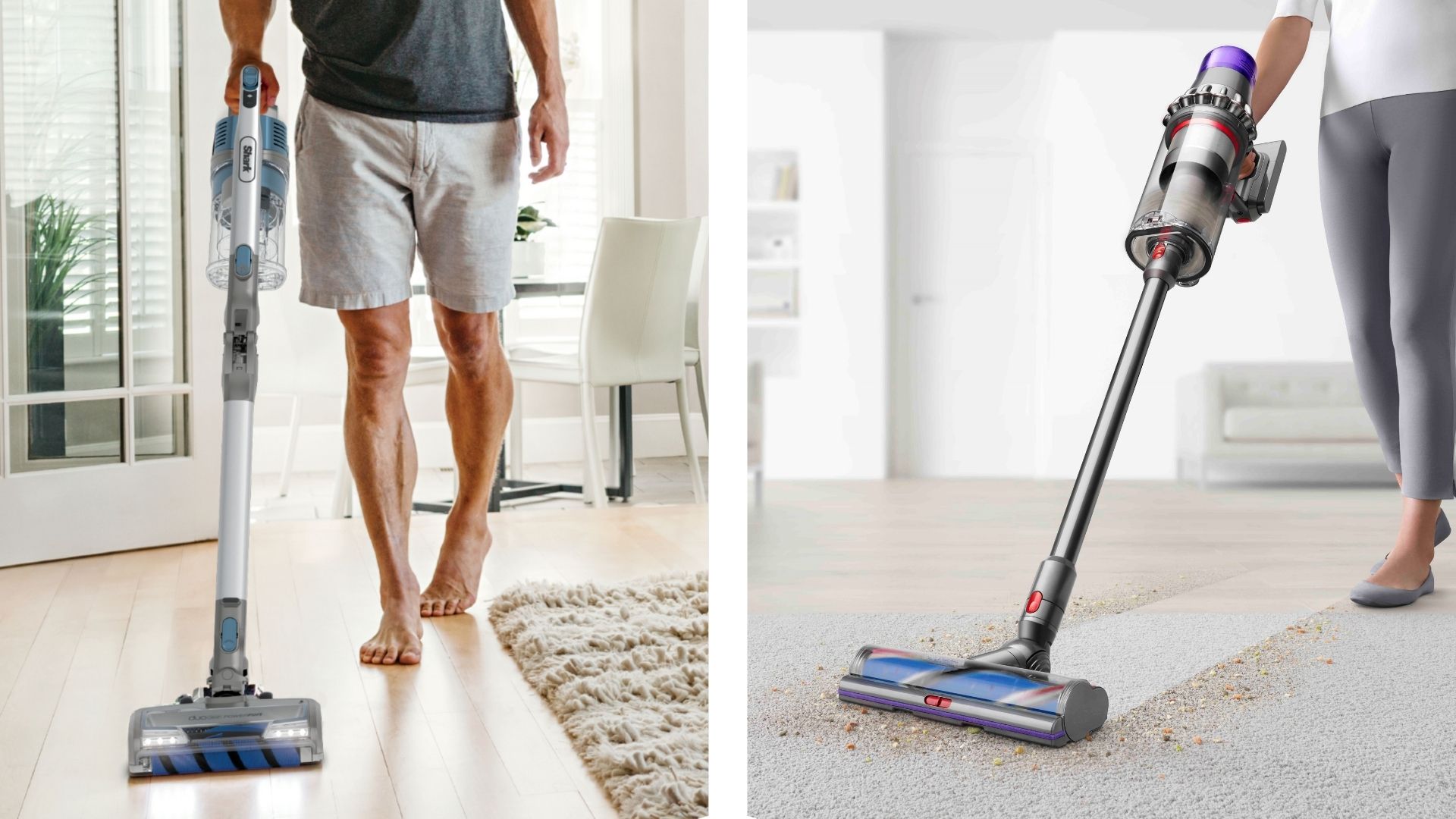
We've tested all sorts of vacuums over the years, but when it comes down to it, Dyson and Shark tend to top our rankings of the best vacuums.
While Dyson have led the market for years, offering premium, powerful vacuums, Shark are hot on their heels with great-value vacuums that don't break the bank.
When you drill into the details, there's a world of difference between the best best Dyson vacuums and the best Shark vacuums. We've had extensive time with both in our homes and testing facility, so we know exactly which comes out on top.
Shark vs Dyson: Which is best?
Dyson is the winner, and our pick for the best vacuum in the world is the Dyson V15 Detect. It picks up debris incredibly well, has a huge capacity, a high-tech laser to illuminate debris and anti-hypoallergenic filtration.
Its upgraded model, the Dyson Gen5detect, has all of these features but is slightly more powerful. It boasts 262 air watts (which measures suction power) compared to the V15 Detect's 230. Find out all about these words and more in my vacuum jargon buster.However, as this is the only tangible difference, I don't think it justifies the $200 increase in price. That's why the Dyson V15 Detect is our top overall pick.
However, the V15 Detect's $700 price point is out of reach for most of us. Very few people can afford to drop nearly a thousand dollars on a vacuum cleaner, no matter how good it is. The Shark Cordless PowerDetect and Shark POWERDETECT Upright are our narrow runners up in the guide to the best vacuum cleaners, offering incredibly effective cleaning without the expense.
However, those are just our overall picks. Read on if you want to drill into the details on the best cordless, pet hair, upright and robot vacuums from both brands. We also cover specific features, including which brand has better value, stronger suction, and the best warranty.
Buy a Shark vacuum if you:
- Are looking for value
- Want powerful suction
- Don't want to pull hair out of your vacuum
- Prefer upright vacuums
- Need LED lights on your vacuum
- Don't like trigger-style power
- Need a longer warranty
Buy a Dyson vacuum if you:
- Want the most powerful suction you can get
- Want the latest innovations like a vacuum laser or particle sensor
- Need top-level filtration
- Want a light-weight cordless
- Have more money to spare
Shark vs Dyson: Which cordless is best?
WINNER: Dyson V15 Detect
The Dyson V15 Detect is our favorite vacuum cleaner in the world. It has amazing suction, stops pet hair from getting stuck, and we love the laser and piezo sensor, which lets you know exactly what you're removing from your floors and adjusts suction power as it detects floor type and dust volume.
The Dyson V15 Detect scored a perfect 100% vs the nearly-but-not-quite 90% of the Shark Cordless PowerDetect, but that's not to say the Dyson is necessarily best for your home. They're two very different vacuums, and while the Dyson has better cleaning performance, the Shark is sold for around half the price, and still has strong suction power and floor detection tech, as well as a set of features you won't find in a Dyson.
It can bend at the wand, allowing you to reach under furniture without straining your back. You also get the option for a Clean & Empty System which stores, charges, empties and cleans your vacuum for you, while storing any collected dust for up to 60 days, minimizing how often you have to do it yourself.
You might also prefer Shark's multi-surface floorhead. It uses two brushrolls so you can pass over carpets and hard floors without having to swap it out, while the Dyson Detect vacuums have separate floorheads for these tasks. It means they're better suited to each surface type but it does require some effort each time.
As mentioned above, the Dyson Gen5detect has the same features as the V15 Detect and performs even better, but costs $200 more. There's also the Dyson V12 Detect Slim, the smaller, more affordable sister to these two vacuums, but while it shares all the same features, its suction power doesn't quite match (150 air watts compared to the V15 Detect's 230 and the Gen5detect's 262). These are great alternatives if you're looking to save money or if you're after the absolute best in the world.
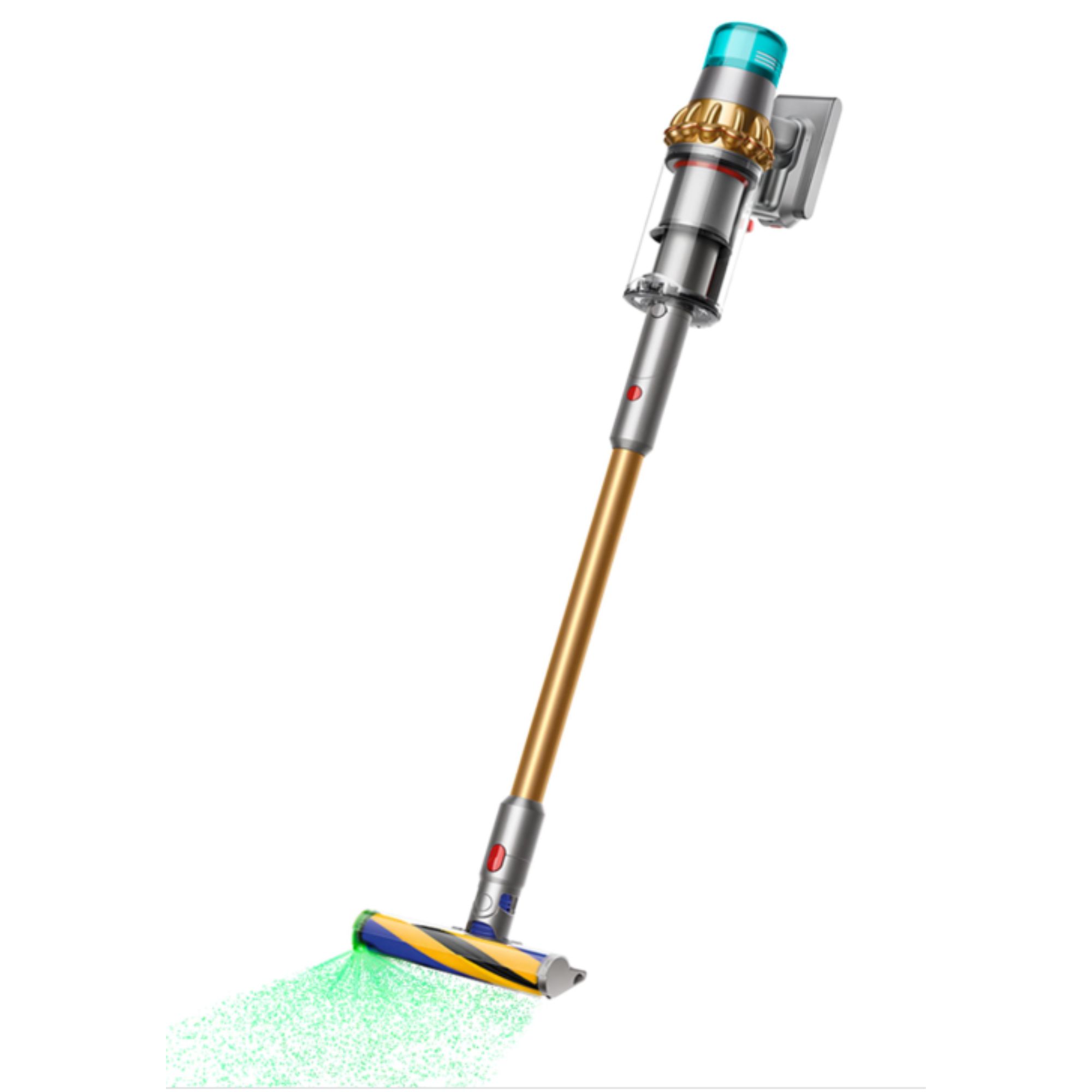
Dustbin: 0.2gal
Battery life: Up to 60 minutes
Power: 230 air watts
Weight: 6.79 lbs
Max noise level: 80 dbA
For
- Green Laser dust detection on Fluffy brush roll illuminates dust particles invisible to the eye
- Piezo sensor and LCD screen shows the size and number of dust particles collected in real-time
- New anti-tangle hair screw keeps pet hair from getting stuck
- Incredible suction
- Versatile attachments
Against
- Motorbar cleaner head with anti-tangle technology doesn't move as easily, and it doesn't have an LED Light
- Must hold trigger for continual operation
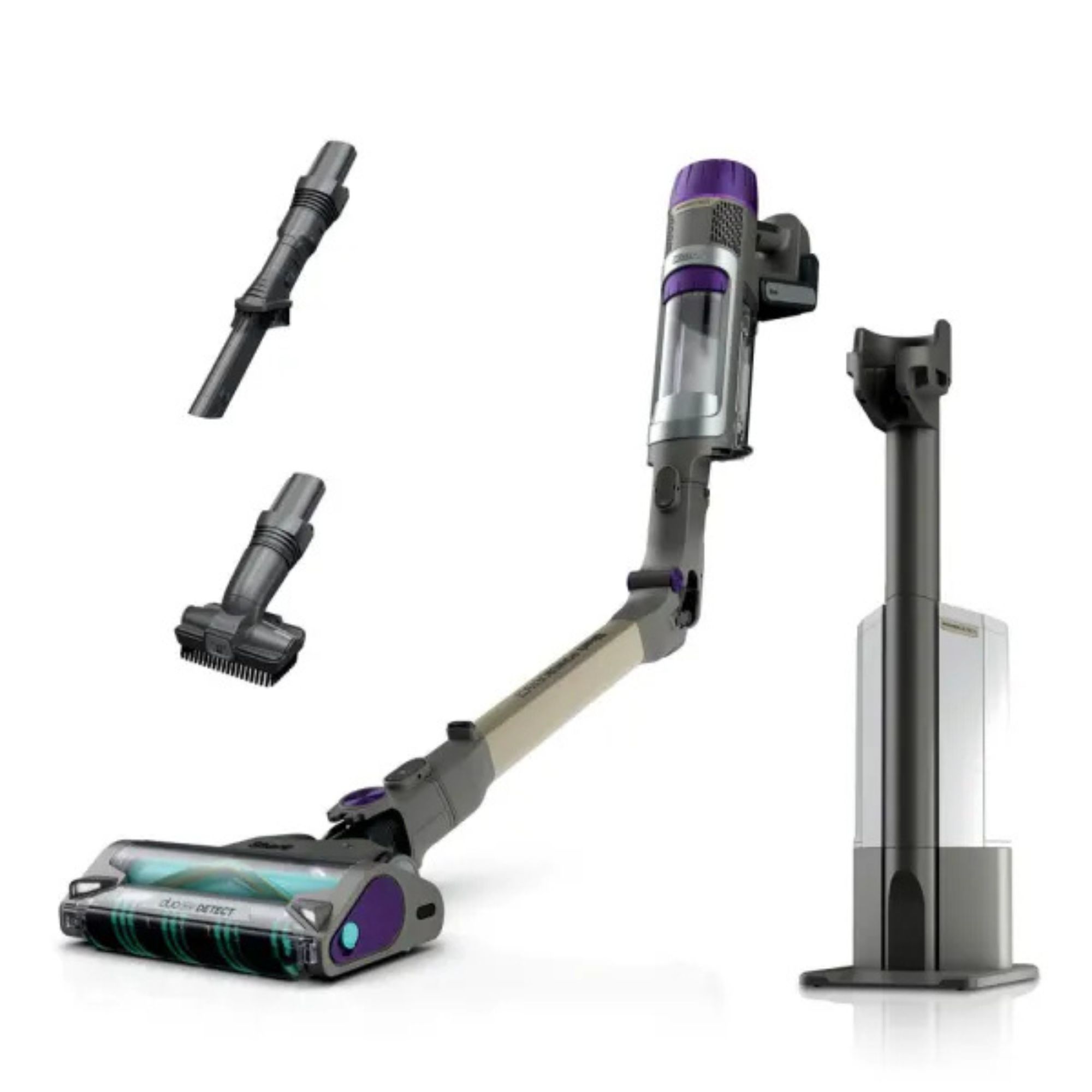
Dustbin: 0.74qt (+2L with Clean & Empty System)
Battery life: Up to 60 minutes
Power: 380 watts
Weight: 7.96lbs
Max noise level: 80 dB
For
- Most powerful suction from a cordless Shark vacuum
- Easy dust, debris and hair pickup across all floor types
- Modular including folding wand to reach all places
- Option of self-emptying base station
Against
- Setting it back on the base station can be a bit tricky
- Reverse pickup is not quite as strong as advertised
Shark vs Dyson: Which is the best upright?
WINNER: Shark POWERDETECT
While Dyson have held back on the release of upright vacuums to focus on the development of their cordless Detect range, Shark have dominated that corner of the market with unique, user-friendly upright vacuums with relentless suction power.
The Shark POWERDETECT is the best upright vacuum on the market. It overcomes the usual limits of an upright with a handy lift-away body that makes it easy to use on stairs. The odor-neutralizing cartridge is no gimmick, genuinely improving the usual smells of pet hair, and it has good anti-hair wrap, so you won't have to pick hair out of the brush roll.
It also detects floor type, dust volumes, and whether you're vacuuming edges to automatically adjust to the optimal suction power. This is why it's our best vacuum for carpet, as well as being an incredible multi-surface vacuum, passing from carpets to hard floors without having to adjust the brushroll.
The Dyson Ball Animal 3 is another good choice, annihilating pet hair from carpets and rugs with its powerful suction. However, this power is one of its weaknesses – it's so strong that it can be difficult to push on carpet. It's also missing those features that we love about Shark's upright vacuums.
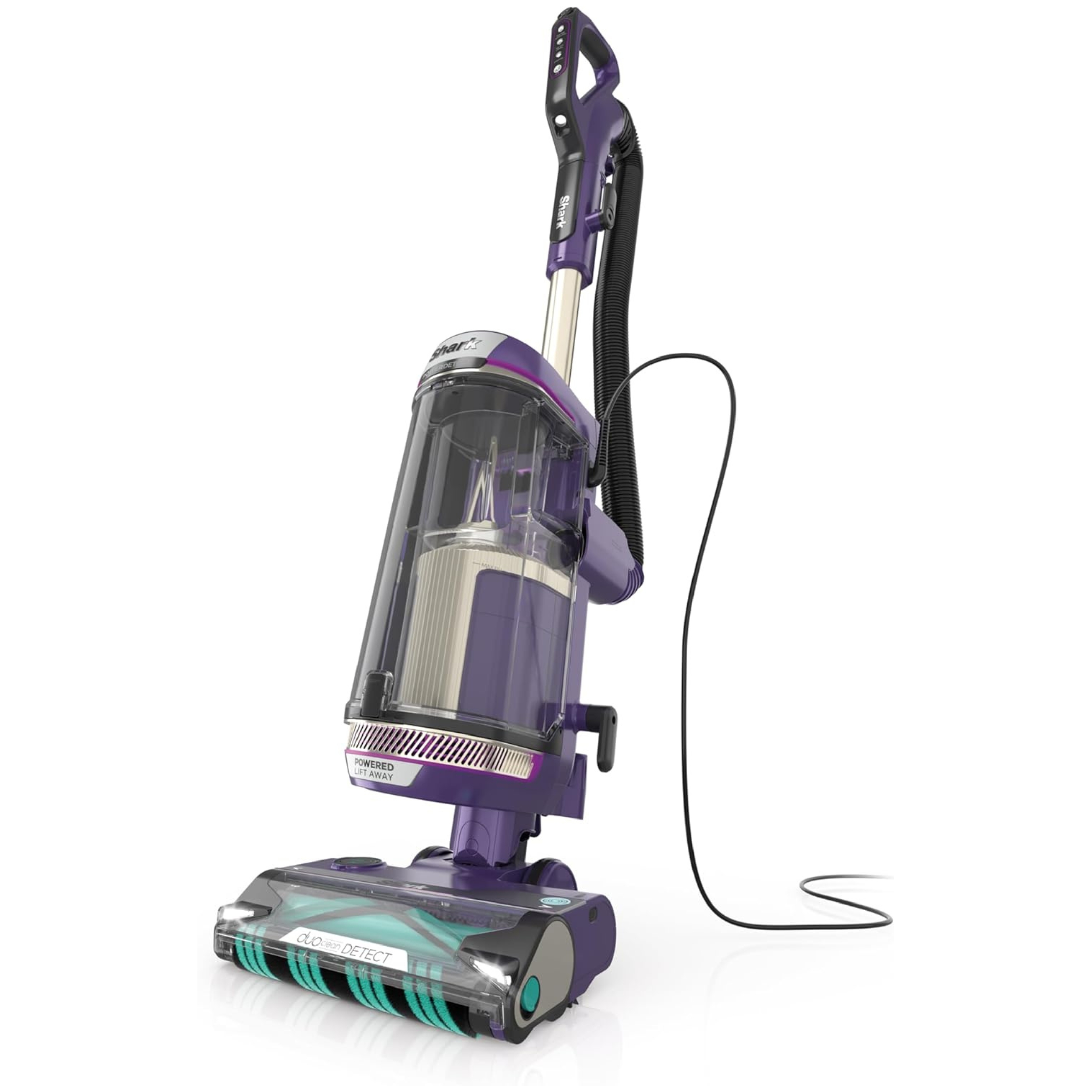
Cord length: 30 feet
Filter: HEPA
Power: 1416 watts
Dust bin: 0.5 gallons
Weight: 17.57 lbs
For
- Powerful cleaning performance on all surfaces
- Odor neutralizer feature
- All the tools for getting into nooks and crannies
Against
- A bit on the heavy side
- Pretty expensive
- Hose limited for getting into higher places
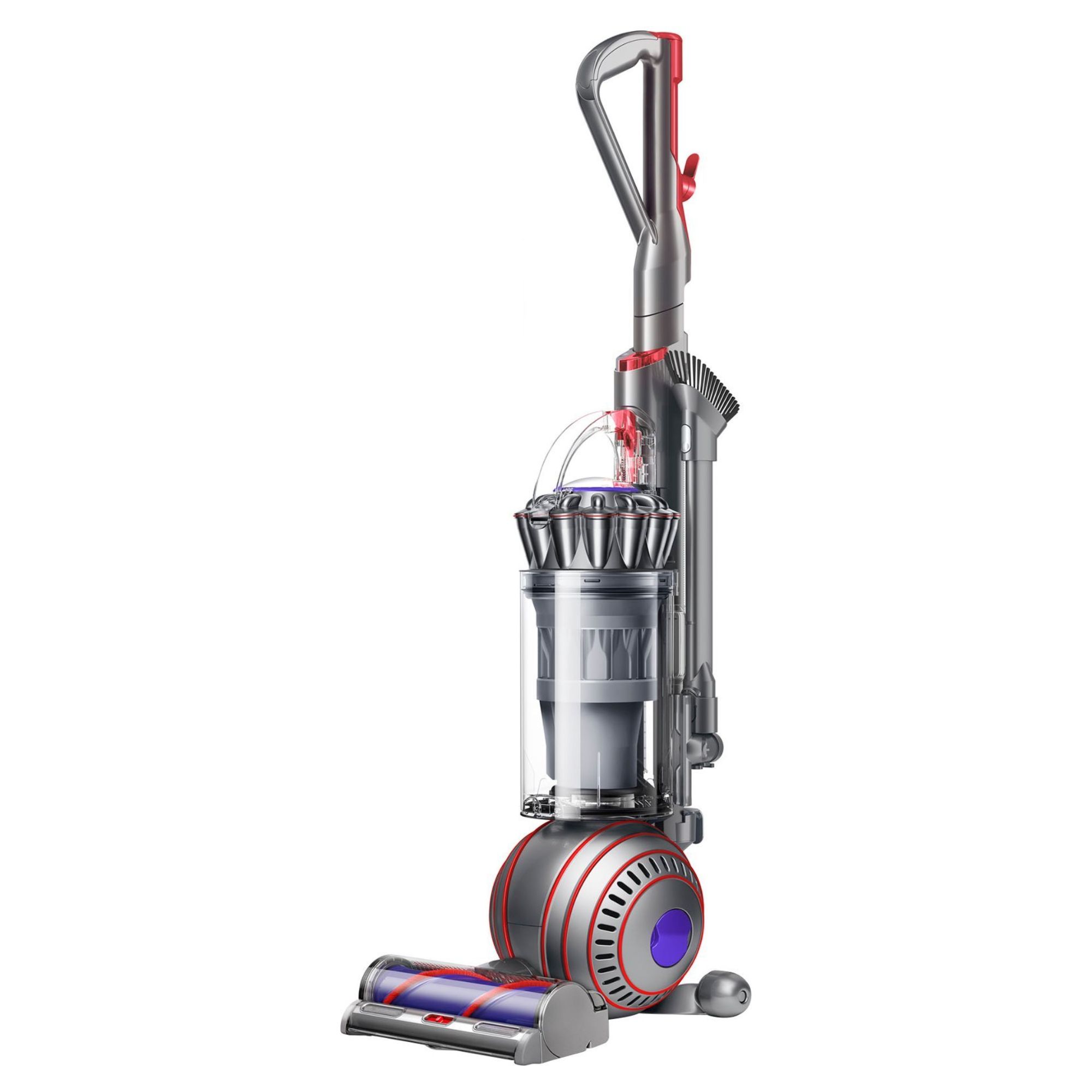
Cord length: 35 feet
Filter: HEPA
Power: 290 air watts
Dust bin: 1.7 liters
Weight: 17.3 lbs
For
- Powerful suction
- Easy to maneuver
- Performs extremely well on carpets
- Three suction settings
- Other models available with different tools
Against
- Heavy
- Awkward control placement
- Hard-to-use hose/wand
Shark vs Dyson: Which is the best robot vacuum?
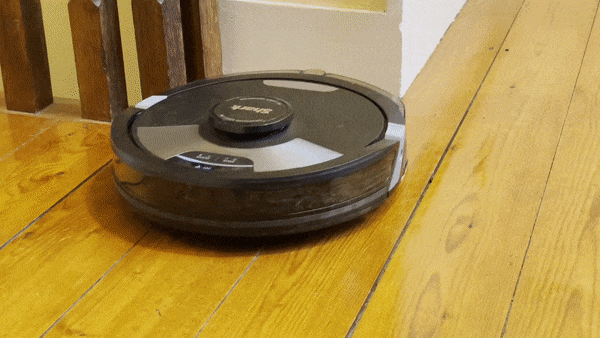
WINNER: Shark
This one's hard to say as we're still in the process of reviewing Shark's latest vacuum, the PowerDetect Robot Vacuum and Mop. But I will say that from our experience with Shark's robots (the Shark AI Ultra and Shark IQ), we've loved how effectively they clean without costing the earth.
Dyson's only robot vacuum, the Dyson 360 Vis Nav, costs a whopping $1,199.99, and while we were fans of how well it cleans, it's already been outperformed in our tests by many others like the eufy S1 Pro Omni and the eufy X10 Pro Omni.
The Shark PowerDetect Robot Vacuum and Mop costs $200-300 less than the Dyson 360 Vis Nav and it comes with a mopping function, a more comprehensive cleaning base, and a more user-friendly app.
Robot vacuums continue to be one of Dyson's few weaknesses. Our head of eCommerce Alex tested their previous model, the Dyson Heirust, and said that it had 'weak pickup and poor room mapping.'
Shark vs Dyson: Which is best for pet hair?
WINNER: Dyson V15 Detect
Our tests found that the Dyson V15 Detect is not only the best vacuum and cordless vacuum, but also the best vacuum for pet hair. We found that it worked spectacularly on every surface, but that performance didn't stop when it came to pet hair. It managed to pick up all the hair from an old dog bed without tangling, while also restoring the bed's color in the process. That type of detangling is second-to-none.
But if the price tag puts you off, our runner up in our tests is the Shark POWERDETECT Upright. This vacuum also excelled when we put it to the test against cat fur, and has amazing odor neutralizer technology that banishes pet smells before they start.
'With one pass, the Shark POWERDETECT had basically picked up every visible piece of hair (as well as litter near the litter box) from the carpet, filling the dust bin with an amount of hair equal to a second cat,' expert tester James wrote in hist review. If you don't want to stretch to $700 dollars, the POWERDETECT is a smart alternative.
Shark vs Dyson: Which is better value?
WINNER: Shark
This one's an easy decision. Shark's latest cordless vacuum costs $400, their latest upright costs $300, and their latest robot costs between $600 and $1,000.
In comparison, Dyson's latest cordless vacuum costs $1,050, their latest upright costs $300 (same as Shark), and their latest robot costs $1,200. Sure, these prices are justified by market-leading engineering and suction power, but in real terms, Shark's vacuums can achieve very similar results for a fraction of the price, while often having unique features not found in Dyson's vacuums.
Shark also frequently run promotions of up to 50% off, while the largest Dyson deals are around $200-300 off, and usually only around Black Friday or Prime Day.
Shark vs Dyson: Which is more powerful?
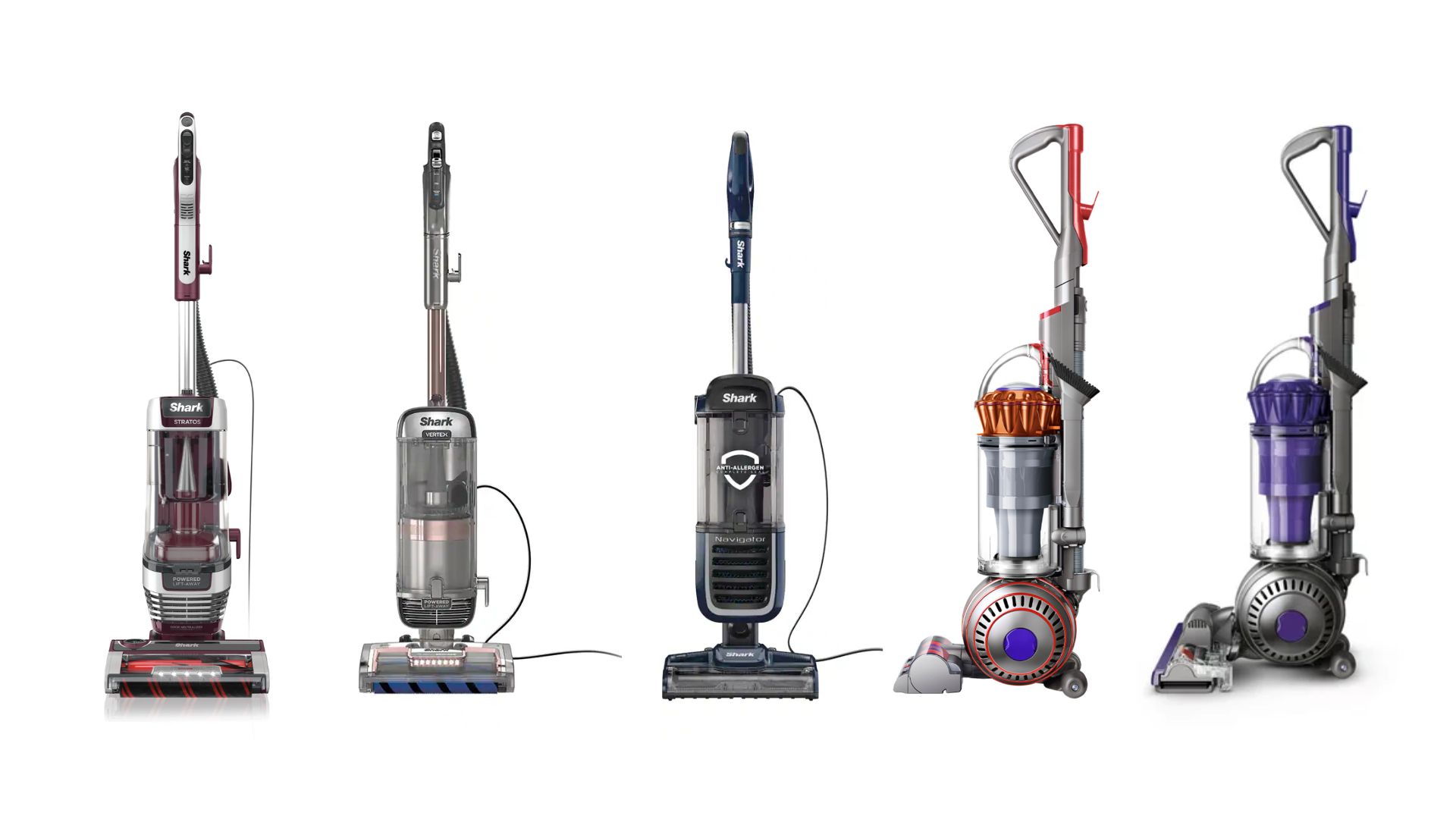
WINNER: Dyson
When it comes to sheer air watts and therefore suction power on the floor, Dyson offer the most powerful around. Their vacuums use patented cyclone engineering that sets them apart from virtually all competitors.
The Dyson Gen5detect and V15 Detect are the only cordless vacuums that can match the suction power of an upright. And their upright vacuum, the Ball Animal 3, was so powerful that it occasionally got stuck to the carpet.
Dyson's Detect vacuums paved the way with automatic suction power, where they'd sense the floor type and how much dirt there is to maintain the right suction. But Shark have since followed in their footsteps, so now you'll find this same feature across Dyson and Shark's best vacuums.
On test, Dyson easily wins this one. We've never experienced such effective cleaning than when using Dyson's latest cordless vacuums. They clean up all dust, small debris, large debris and even hair in a single pass. Shark's vacuums are great, but they're not quite that powerful.
Dyson makes different floorheads for different surfaces. The FluffyOptic floorhead is optimized for hard floors with softer fibers to rid floors of dust and a green laser to reveal invisible dust, while the detangling Motorbar floorhead digs deep into carpets, though still effective on hard floors if the fluffy floorhead is not included.
Shark doesn't do this, instead opting for multi-surface floorheads with versatile dual brushrolls to work seamlessly across different floors. This makes cleaning easier, but means they're not getting the specific treatment you'll find in Dyson's specialized floorheads.
Shark vs Dyson: Which has better battery life?
Both Dyson and Shark offer comparable battery life. Both offer up to 70 minutes runtime for their best cordless vacuums, like the Dyson Gen5detect and the Shark Cordless PowerDetect. Depending on the model, both Shark and Dyson offer designs with removable batteries, so you can buy a spare to achieve 140 minutes of runtime between charges.
Shark vs Dyson: Which has the bigger dustbin?
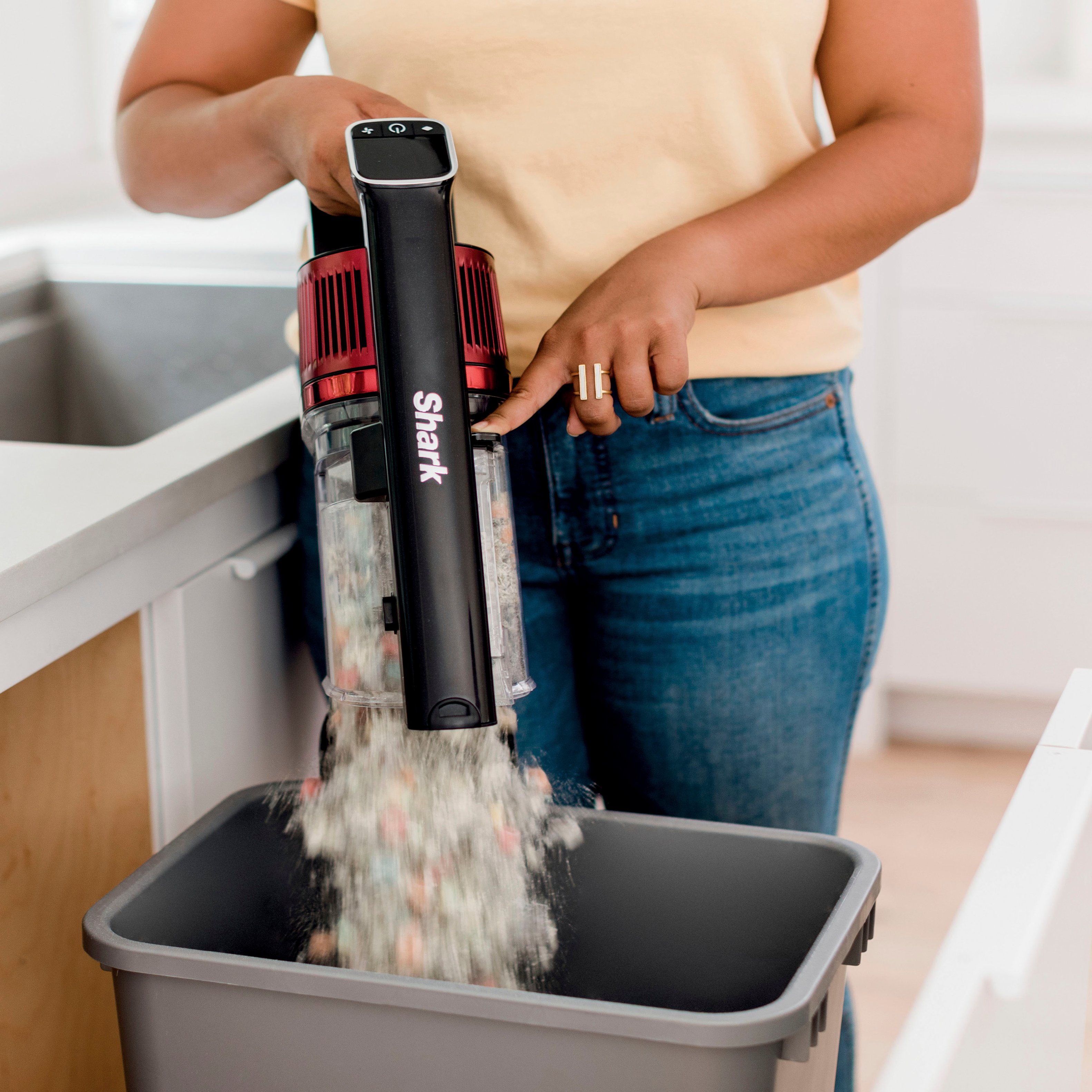
Dyson was actually the first to engineer bagless dust bins, using the clear dust bin design to be able to keep track of how much dirt has been collected and a system that will never lose suction because the bin is full. At this point, however, both Shark and Dyson use bagless dust bins.
Both dust bins use an easy, one-touch propeller system designed to be hassle-free and hygienic. Dyson's base opens and pushes the dirt forward, while the Shark releases the base, which actually has a wider mouth for dirt to dispense out of.
We've personally found a better emptying experience from Shark as we're not having to reach in to take out stuck clumps of debris, as has been our experience with Dyson. The bins can also easily be rinsed with water. Dyson's dust bins can typically only be wiped with a damp cloth, as they are connected to electrical components.
Within the dust bin, hair wraps around the filters inside on both the Shark and Dyson. Hair is easier to pull out of the Shark, but it's more difficult to place your hand up in the shaft of the bin. Dyson's dust bin utilizes a rubber stopper to push the dirt down and keep it going in one direction.
Traditional uprights tend to have larger dust bins by default, while cordless models are typically smaller, in an effort to keep them streamlined and lightweight.
Shark vs Dyson: Which has the best filtration?
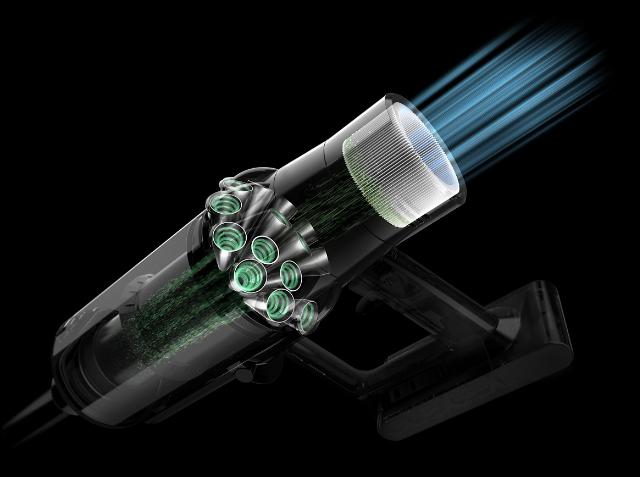
WINNER: Dyson
All of Dyson's products carry advanced whole-machine HEPA filtration, emphasizing its five-layer filtration and cyclone technology that is the heart of Dyson's technology to keep dust and dirt trapped inside.
The dust bin is only the first stage to separating the particles visible to the naked eye. Dyson’s multi-cyclone technology, with up to 18 cyclones, depending on the model, maintains the velocity required to remove fine dust from the airflow. Pre- and post-motor filters are responsible for filtering the smallest particles, capable of removing 99.97 percent of particles invisible to the human eye as small as 0.3 microns.
Dyson filters are easily washable and help prevent the build-up of allergens or dander.
Most Shark machines feature their Anti-Allergen Complete Seal, which traps dust, allergens, and irritants and seals them inside, keeping it out of the air you breathe. Particles filter through the washable foam and felt filters. Some more of the premium models will also feature HEPA, but it will drive up the price.
Shark vs Dyson: Which has the better warranty?
WINNER: Shark
Shark is the clear winner here, offering five-year warranties where Dyson only offers two-year parts and labor warranties.
Next, consider the best Dyson alternatives for impressive vacuums on a smaller budget.







